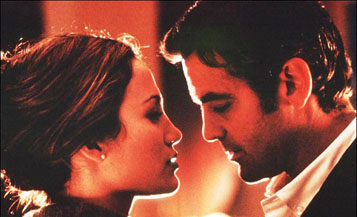A-List: George Clooney
By Josh Spiegel
November 12, 2009
Okay, so none of that has anything to do with Clooney, but his seemingly easy charm is one of the most enjoyable aspects of all three films. In the third film, for example, it's proven that all you need to do to get Al Pacino to stop blustering around like a madman is just stick Danny Ocean in front of him. Clooney's best when he's ribbing Brad Pitt, playing Ocean's best bud, Rusty Ryan; another top scene, possibly the best in the series, is a tete-a-tete with Roberts in the first film in a fancy restaurant. Their back-and-forth volleying here is the closest we've gotten to Tracy and Hepburn or Grant and any female costar in years. Though the series isn't beloved, if it gets Steven Soderbergh money for other movies, I say bring on Ocean's Fourteen.
Good Night, and Good Luck.
In 2002, George Clooney decided to go the way of previous Hollywood pretty boys such as Warren Beatty and Robert Redford, and get behind the camera, sit in the director's chair and make his own movie. That film, Confessions of a Dangerous Mind, is one of the rarer beasts: it's pretty flawed, but truly fascinating to behold. A mix of the Coens and Steven Soderbergh, the film sports a phenomenal lead performance by Sam Rockwell, flashy cinematography, but not a fully impressive piece of work. His follow-up, a Best Picture nominee of 2005, though, didn't disappoint. Good Night, and Good Luck. is Clooney's sharpest effort in terms of making a political point without seeming preachy. The story of how Edward Murrow helped bring down Joseph McCarthy during the height of the Red Scare, the film is not only engrossing but stylish, well-made, and perfectly acted.
As Murrow, David Strathairn gets one of the best yet least emotional leading roles there is. Even when he's not delivering his scathing diatribes in a monotone to the CBS TV audience, Murrow doesn't raise his voice or even get too playful with his producer and friend, Fred Friendly (Clooney). His fight against the system is painful to watch, if only because we know that a win won't feel to successful. Clooney's direction, though, is slick and seamless, offering the best of black-and-white cinematography, courtesy of Oscar-winner Robert Elswit. What's more, he's able to blend the main action with an intriguing subplot featuring Robert Downey, Jr. Clooney's third film, Leatherheads, wasn't a big success, but hopefully, he'll get behind the camera soon.
Michael Clayton
I'll admit this much up front: I am not a big fan of Michael Clayton, the movie. For one, I have begun to hate, hate, HATE the screenwriting device that's so often employed in films and on TV, in which we are introduced to a shocking bit of action at the beginning, and then rewind to find out how that action came to be. In Michael Clayton, we open with the title character, played by Clooney, inadvertently extricating himself from his car before it blows up. And then we take the next 90 minutes to find out how he got himself in that position. Thanks for killing the suspense! See, now, I'll know that, when Clooney gets into the same car 90 minutes from now, it'll blow up but he won't be in it. Real buzzkill, if you ask me.
However, I am very much of a fan of Clooney's performance in this film. Is it good or bad that the final ten minutes are seriously awesome, way more than the rest of the film? His final face-off with Tilda Swinton, as a conflicted but immoral corporate lawyer, despite being spoiled in the previews, is the stuff of legend. Following that up with the final shot, focusing on Clooney in a taxi, is real genius. Now, if the rest of the movie was as awesome, I'd be in love. As it stands, Clooney's performance as a corporate fixer who gets in too deep is generally and genuinely great; frankly, it looks like his role in Up In The Air will be similar if lighter. Michael Clayton was a failure of script and direction, not of performances, especially not the lead.
Continued:
1
2
3
|
|
|
|




